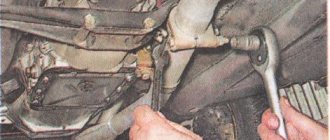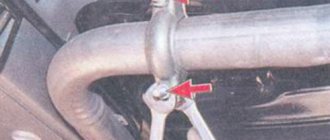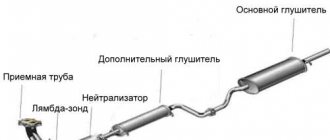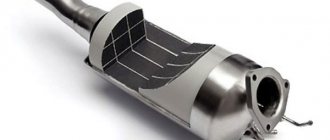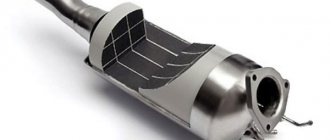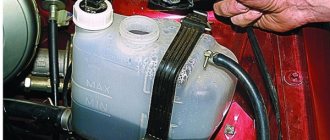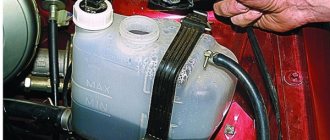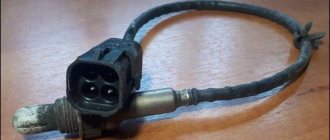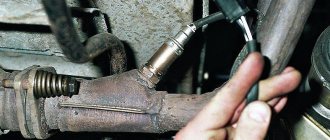Exhaust system design of VAZ 2107
- a receiving pipe into which gases enter from the exhaust manifolds;
- VAZ 2107 resonator (additional muffler), where gases are directed from the exhaust pipe and where the exhaust sound is partially reduced;
- muffler, which absorbs most of the engine exhaust noise.
- muffler mounting pad;
- pillow bolt;
- muffler suspension belt;
- clamp bolt and clamp securing the muffler to the resonator;
- clamp bolt and clamp securing the resonator to the exhaust pipe;
- clamp bolt and clamp securing the exhaust pipe to the body;
- nuts securing the exhaust pipe to the manifold;
- pad;
- locking plate;
Installation of an injection system on a VAZ 2107 required modernization of the exhaust system. Two additional details were added to it:
In connection with the installation of the catalyst, the VAZ 2107 resonator (injector) was moved a little back.
Advantages and disadvantages of the injection modification of the VAZ 2107
- thanks to the injector, the engine operates more stable in all modes;
- the specific power and torque of the injection engine are higher;
- the exhaust of a VAZ 2107 with an injection system is cleaner than smoke from a carburetor engine;
- Driving a car with an injection engine is easier, it is not so demanding on the driver’s qualifications and “forgiving” mistakes when operating the gas and clutch pedals.
- the clearance of the injection "seven" decreased to 7 cm, which worsened its cross-country ability;
- due to the installation of the catalyst, the “survivability” of the exhaust system has decreased;
- the high temperature of the catalyst sometimes causes grass and dry leaves to ignite when the car is stopped.
Reception pipe: what is it and what are its functions
The exhaust pipe of the muffler is an important element in the exhaust system of a car. It performs a complex and important function, removing exhaust gases that accumulate in the exhaust manifold of a car engine. Having passed through it, the exhaust gases end up in the muffler catalyst. If the vehicle's exhaust system is not equipped with a catalyst, then the exhaust gases end up directly in the front (additional) muffler.
The exhaust pipe is an important part of the car exhaust system, the strength of which is subject to increased requirements.
Replacing the muffler VAZ 2107
- loosen the clamp bolt and remove (move) the clamp;
- pull the flared muffler pipe off the resonator (if that doesn’t work, knock it down with a hammer and chisel);
- remove the muffler from the cushion and mounting straps;
- install a new muffler on the VAZ 2107;
- tighten the clamp.
The VAZ 2107 resonator does not have fastening parts to the car body, so it is necessary to hold it when replacing it. Otherwise the exhaust pipe will be bent.
- tap clamps and pipe connections with a hammer;
- loosen the bolts of the clamps and move the clamps fastening to the “pants” and the muffler;
- disconnect the resonator from the muffler by undocking the pipes;
- disconnect the resonator from the receiving pipe (“pants”);
- install the new resonator in the correct position;
- connect the parts and tighten the fastening clamps.
Resonator malfunctions and repairs
Resonator malfunctions include:
- pipe beating on protruding parts of the body and other elements;
- burnout of the end part of the tank at the welding site of the body and pipe;
- burnout of the housing or internal perforated channel;
- exhaust gases exit through the mounting joints.
An annoying knock coming from under the car's bottom is usually the result of a loose exhaust pipe beating against the body and other components. The reason for this is the rubber fasteners, which wear out and stretch over time and cannot provide rigid fixation of the exhaust tract when moving. The problem is solved by replacing these fasteners.
Black soot indicates burnout of the resonator tank
Typically, exhaust tract hangers last much less than the pipe itself. Check the condition of the rubber bands at intervals of 10 thousand km; if cracks are found, immediately install new suspension mounts.
Other problems can be resolved in the following ways:
- The burnout on the side of the resonator can be welded. There is no need to remove the pipe to do this. An experienced welder will do the work on site, covering the body with a sheet of asbestos.
- If exhaust gases are observed escaping through the joints of the exhaust system, the mounting clamp or flange should be tightened further. You can also loosen the fastening, fit the parts closer together and re-tighten the clamp.
- If the housing or internal channel burns out, the resonator is usually replaced with a new one. If the fistula is small, you can try to weld it without removing it from the car.
If there is a slight burnout, you can try welding the resonator tank directly on the car
Car enthusiasts with experience in welding can make a resonator tank with their own hands. To do this you should:
- Remove the resonator from the car.
- Carefully cut the body with a grinder.
- Take all dimensions (channel and hole diameters, body dimensions).
- Make a new tank according to the measurements taken.
- Weld old pipes to the new tank.
- Install a new resonator on the car.
Video: malfunctions of the exhaust system of classic VAZ models
Replacing the exhaust pipe (“pants”) of a VAZ 2107
- loosen the clamp and disconnect the pants from the resonator;
- unscrew the four nuts securing the exhaust pipe to the manifold;
- remove the “pants” (reception pipe) and gasket;
- install a new gasket;
- install a new exhaust pipe;
- connect the exhaust pipe to the resonator, tighten the fastening clamp;
- tighten the nuts securing the “pants” to the manifold.
- the resonator or exhaust pipe is fixed at the wrong angles;
- engine mounts sagged.
Exhaust System Mounting Parts
A clear understanding of the algorithm of actions when carrying out such an event as replacing a VAZ 2107 muffler will help every car enthusiast carry out his plans quickly and without errors. On the one hand, removing the old muffler and installing a new one seems simple, but on the other hand, you need to be prepared for some difficulties.
Why and how often is it necessary to change the VAZ 2107 muffler?
The exhaust system of a car, despite its relatively simple design, performs many functions. The main ones are:
- removal of fuel combustion products;
- significant reduction in exhaust sound level;
- maintaining air balance with the intake system;
- ensuring effective cleaning and ventilation of cylinders.
The VAZ 2107 muffler experiences enormous loads like no other part of the car. First of all, constant temperature changes have a destructive effect on the metal, which actively destroys not only the protective paint and varnish coatings, but also the structure of the metal itself.
Gases heated to a high temperature literally “eat up” the internal filling of the muffler, mixing with water condensate and oils, dissolving the metal walls, forming through corrosion. Externally, the muffler elements are also adversely affected by moisture, road sand and gravel; salt solutions in winter intensify the decomposition process.
As a result, after some time the driver can observe under the bottom of the car the pitiful remains of what was once called a muffler. Whether we like it or not, the muffler of a VAZ 21074 or any other model will have to be changed periodically. To the question of how often you should change the muffler, every car enthusiast must find the answer himself.
The service life of an exhaust system, like many others, depends on factors such as:
- activity of vehicle operation;
- quality of fuel used;
- the car owner’s attitude towards the condition of the car;
- frequency of use of the machine in adverse weather conditions;
- quality of previously installed exhaust system parts.
Having come to terms with the fact that the VAZ 2107 muffler will not last forever, you need to buy a new one and start replacing it.
Replacing the VAZ 2107 muffler - procedure
An inherently simple procedure can take a lot of effort and time. Before installing a new muffler, you must remove the old one. To do this you should:
- install the car on an overpass or above an inspection hole;
- prepare a set of tools, ensure good lighting under the machine;
- The muffler is connected by a pipe to the resonator pipe in front of the rear axle. The ends of pipes with a slot and a male-female connection are tightened from the outside with a coupling;
- Corrosion under the influence of lubricant and temperature can solder the joints so much that it becomes very difficult to remove them. It is better to moisten the pipes at the junction and the coupling in advance with a solution that corrodes corrosion. For this purpose, as a last resort, brake fluid or used oil is suitable.
The procedure for replacing the muffler is as follows:
- the crimp coupling is untwisted or cut off using a cutting tool (grinder) (in this case, a new coupling should be on hand);
- use a thin chisel or screwdriver to bend the flared edges of the pipe;
- the muffler is disconnected from the resonator (if it comes out tight, you can help yourself with a hammer by tapping on the pipe);
- hanging pillows are detachable. By the way, when buying a muffler, it is advisable to buy three suspension rubber bands (two in the center and one at the rear).
After this, the old muffler is in your hands and you can install the new one in the reverse order.
How to replace the muffler of a VAZ 21074 and other modifications of classics
Very often, car enthusiasts, seeing in the title of the article that the make of the car does not exactly match what is indicated in the registration certificate, continue to search for instructions. VAZ cars are charming because they differ from each other for the most part only in appearance, but the internal structure is completely identical.
It doesn’t matter what kind of car is in the garage: 2105, 2104, 2107 or 21074 - their exhaust system is completely the same. Having studied the repair instructions for one car, you can safely begin repairing another classic model.
Removal process
In the process of removing an element of the exhaust system from a VAZ 2107 (injector) for its subsequent replacement. The following tools will be useful to you:
- wrench 13 (open-end type);
- ratchet or crank;
- deep heads on 13 and 10;
- Bulgarian;
- flat screwdriver (can be replaced with a chisel);
- pliers;
- hammer.
To figure out how to remove the muffler from your VAZ correctly and replace it. Please read the following instructions carefully:
- install the car over an inspection hole or on an overpass;
- unscrew (cut with a grinder) the crimp coupling;
- using a screwdriver or thin chisel, bend the flared ends of the pipe;
- using a hammer, which you will use to knock on the pipe, separate the muffler from the resonator;
- Unfasten the hanging pillows.
After this, the product can be freely removed to be replaced with a new one, which is installed in the reverse order.
Please note that the connection between the muffler pipe and the resonator pipe is located in front of the rear axle. The ends of the pipe with slots and female-male fasteners are tightened using a coupling. Removal of the product can be complicated by corrosion, which develops under the influence of temperatures and lubrication.
For this reason, moisten corroded parts with an anti-corrosive agent in advance (motor oil or brake fluid will also work). If you are planning to install a new muffler, it would be a good idea to purchase new suspension rubber bands (1 for the rear and 2 for the center location).
When to change the resonator
The resonator of any car is an additional muffler that reduces the noise level of the engine. In addition to the main “can,” the resonator, or as it is also called, receiving pipe can be equipped with an additional one.
Ultimately, holes appear on the surface of the resonator, which disrupt its operation. Exhaust gases escape through these defects, creating an unpleasant sound of the engine, which is not only unpleasant to others, but will certainly not leave traffic inspectors indifferent. That is why a damaged resonator must be replaced immediately.
To change the resonator, you need to stock up on all the necessary keys, kerosene or WD-40, as well as a lot of patience and accuracy. The fact is that high temperatures cause the exhaust pipe fasteners to melt, which subsequently makes it difficult to remove. In addition, you will need an inspection hole or overpass, otherwise changing the resonator will be very inconvenient.
Many automotive technicians suggest applying sealant before installing the exhaust system. Whether to do it or not is up to you. In any case, the reliability of fastening and sealing the exhaust system is limited only by the force that the clamp allows you to make.
